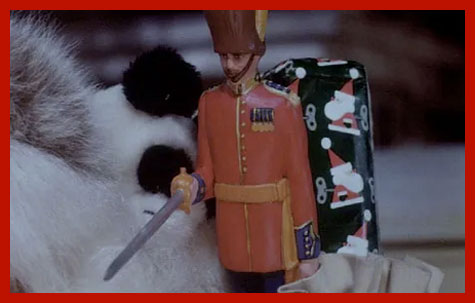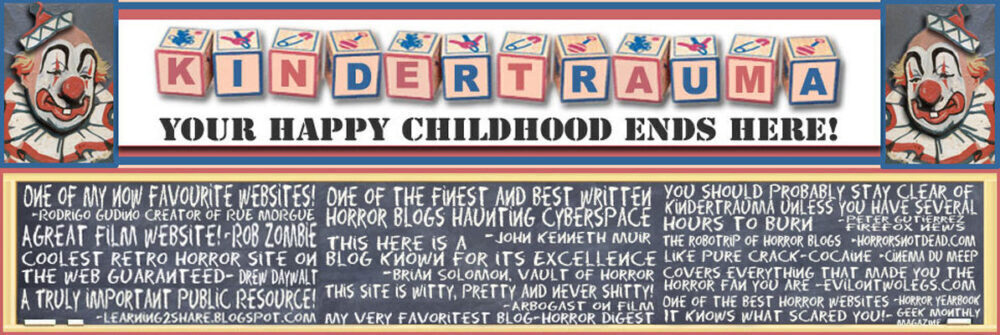
Lewis Jackson's cult classic Christmas Evil (1980)—or as it was known during production and before the distributor changed the name, You Better Watch Out—opened in a few theaters to little notice back in 1980. Then it mostly disappeared, only to see a revival of sorts in recent years on Blu-ray and streaming. For many of us it's now an annual holiday watch. Christmas Evil has something special going for it that few other Christmas horrors do: it's quite possibly the most pointed critique of the holiday season ever made.

Released during the slasher boom set off by Halloween (1978), Christmas Evil might've been marketed as a slasher (honestly, it was barely marketed), but that's not what Jackson was going for. Like its anti-hero protagonist, it was an oddity, a methodically paced character study of an unstable, Santa-obsessed, middle-aged toy factory worker, which shares more in common with Taxi Driver than Halloween.

The film opens in 1947 when young Harry, his little brother Phil, and their mom secretly watch Santa Claus (their dad in disguise) deliver gifts under the tree. Later, after Phil flatly denies that Santa is real, Harry sneaks back downstairs, only to find a softcore version of "I Saw Mommy Kissing Santa Claus" happening between sexy, lingerie-clad Mommy and horny and hungry Santa Daddy. Disturbed by seeing Santa putting his mitts (and mouth!) all over my Mommy's lusciously nylon-and-garter-belted legs (and beyond!), he runs upstairs, breaks a snow globe in a fit of rage, and intentionally cuts his hand with a shard of the glass. Fade to red, and the film's original title screen appears.

In present day 1980, we find Harry working at a toy factory and living in an apartment that appears to be decorated full-tilt for Christmas year-round. Stage and character actor Brandon Maggart plays Harry. He is excellent in the role, and also the source of one of my favorite fun movie facts: he's Fiona Apple's dad! What makes Maggart's performance so effective is how he engenders such sympathy for Harry, who is looked down on by his coworkers, treated like a nuisance by his brother, and generally ignored by the rest of the world. He's very much spiritually connected to Travis Bickle's "God's lonely man," even talking to himself—or having total breaks with reality—in the mirror frequently throughout the story.

Harry already fancies himself a street-level Santa, clearly: he spies on the neighborhood children, keeping notes on who's naughty or nice in a huge, leatherbound book. It's chilling to watch him peeping through the kids' windows, yet at the same time we never really feel any of them are in serious danger from Harry….well, except little foul-mouthed, Penthouse-reading Moss Garcia, who Harry seems particularly disturbed by because he represents the new, profane world of 1980 ("Negative body hygiene" and all) while Harry is stuck in an idealized 1940s fantasy life. That fantasy is important to remember as you watch the film. With Harry as our unreliable narrator, it's hard to know what's real and what's not. Are people's reactions to Harry filtered through his own fractured lens?

Harry's breakdown seems fueled by an inability to reconcile his nostalgic, pure view of Christmas with the cynically capitalist way the rest of the adults in society see the holiday. Harry identifies with the children who still believe in the magic and wonder of Christmas, yet reality repeatedly shatters these notions, day after day, making it almost impossible for him to maintain his composure.

Seeing the adulation Santa receives at the Macy's Thanksgiving parade triggers something in Harry. He immediately constructs a Santa costume of his own, builds toys in his workshop, and by Christmas Eve his mania is in full swing. He glues his Santa beard to his face (ouch!) and heads out to deliver some holiday cheer. He alternates between sweet acts of Robin Hood style kindness—delivering bags full of toys to a children's hospital, which he stole from the toy factory after becoming completely disillusioned with the place—and cold-blooded murders. The bloodletting is spontaneous at first, but then calculated, as Harry sneaks into the house of a particularly crass coworker and murders the man in his bed while his children eagerly await Christmas morning, just down the hall.

As Harry's Christmas Eve massacre carries into Christmas night, he has a series of encounters with holiday revelers, some jovial and some disturbing. After a final confrontation with his brother, who has deduced that Harry is the killer Santa the news media is reporting about, Harry drives off in his van, on which he has painted a Santa sleigh. Driving wildly, he crashes off a bridge and that's when the film takes a turn for the surreal, as the sleigh-van literally flies off into the night, with Harry reaching a state of pure Yuletide bliss.

I tend to think Harry perished in the crash that Christmas evening, but it also appears that Phil is witnessing the flying van just as we are, so maybe not? Either way, Christmas Evil sticks with you. Jackson never directed another movie again, which is a shame, but at least his sincere, troubling, and borderline-genius piece of work has finally found its audience, all these years later. The allure of nostalgia is powerful, after all, making the core of Harry's story all too relatable for many viewers.


I love this movie. It’s one of John Waters’ favorite films – he even provided a commentary for the Vinegar Syndrome blu ray. Waters has interesting things to say about Christmas Evil – he’s called it one of the best, most accurate depictions of the act of drag in the movies (with the drag role being Santa, of course).
I like Silent Night, Deadly Night enough, but it’s (mostly) a rote slasher, while Christmas Evil goes into much more interesting directions.
When I first watched this, I was expecting early 80s slasher trash, but it had a depth beyond that. Quite interesting, and now I want to rewatch after reading your post.
I just watched this for the first time this year and was very surprised (and impressed) by it. Based on what I’d heard, I was expecting an odd, grimy little slasher film. And while it’s certainly odd and definitely at least a little grimy, it is so much more. It’s an occasionally upsetting and surprisingly disturbing exploration of psychological instability (the comparisons to Taxi Driver are apt!) that makes no bones whatsoever about “going there.†Like Harry’s character, the film itself feels unpredictable, and I was on edge the entire time, never sure of where it was going or how dark it might get. I mean all of this in a complimentary way, of course. The way Jackson intertwines childlike whimsy with deeply troubling inner torment is completely unique and deftly handled. I have simply never seen another film like this one. This is a great write up. I’m looking forward to revisiting Christmas Evil again in the future.
I want to like this movie, because I like the idea of killer Santa's, but the one time I saw it (on John Waters' recommendation) I found it really boring; I will give it another try and see if anything changes. The killer Santa concept I felt was done better in other films. Comparing it to Taxi Driver (my all time favorite film) is really holding it to a standard I don't think it can manage. I will be satisfied if it doesn't bore me to death.